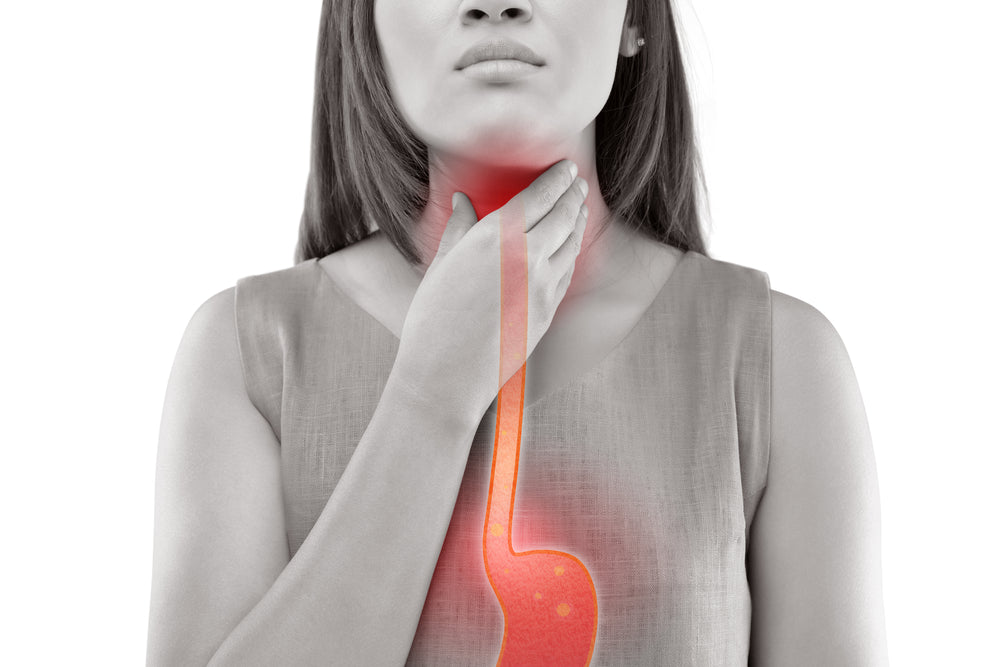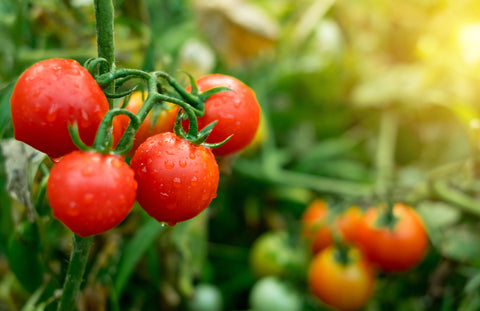Best Foods for Acid Reflux

Share
Acid reflux is a digestive condition in which stomach acid or bile irritates the food pipe lining. It is considered a chronic disease that occurs when stomach acid or bile flows into the food pipe and irritates the esophagus lining.
If you experience acid reflux more than twice a week, it may indicate another condition called gastroesophageal reflux disease (GERD). However, it is possible to manage acid reflux and GERD and reduce symptoms with diet and lifestyle changes. In this article, we will talk about the best foods for acid reflux.
What Is Acid Reflux Disease?
Acid reflux, also called acid regurgitation or gastroesophageal reflux, occurs when contents from your stomach move back up into your esophagus. There is no single underlying cause of acid reflux. Still, various risk factors can increase the likelihood of developing this condition.
One common risk factor for acid reflux disease is a stomach abnormality called a hiatal hernia that occurs when the upper part of the stomach and lower esophageal sphincter move above the diaphragm. The diaphragm typically helps keep acid in our stomach. Still, if you have a hiatal hernia, the acid can move up into your esophagus, resulting in acid reflux.
Other common risk factors for acid reflux disease include:
- Eating large meals
- Lying down after a meal
- Too much movement or inversion after a meal.
- Being overweight
- Snacking late at night
- Eating certain foods like tomato, chocolate, citrus, spicy foods, fatty foods, onions, or garlic
- Drinking certain beverages, such as carbonated drinks, tea, coffee, or alcohol.
- Being pregnant
- Certain medications like ibuprofen, aspirin, or blood pressure medications
- Smoking
What Are the Symptoms of Acid Reflux Disease?
Two primary symptoms are associated with acid reflux disease—heartburn and regurgitation. Heartburn refers to burning pain or discomfort that can move from the stomach to the chest or throat. Regurgitation is a sour or bitter-tasting acid that backs up your mouth or throat. It may contain some food particles—especially if you have recently eaten it.
While heartburn and regurgitation are characteristic symptoms of acid reflux disease, some other symptoms of acid reflux may include:
- Bloating
- Burping
- Nausea
- Difficulty swallowing
- A sensation of food being stuck in your throat
- Hiccups
- Bloody or black stools
- Bloody vomiting
- Weight loss
- Wheezing or dry cough
- Frequent sore throat
If you have symptoms of acid reflux multiple times per week, you may have gastroesophageal reflux disease (GERD). GERD is a chronic digestive condition with the same symptoms as acid reflux; only they occur more frequently—typically no less than twice a week.
According to research, GERD affects about 20 percent of people in the United States. If left untreated, it can sometimes cause severe complications because, over time, the reflux of stomach acid damages the tissue lining the esophagus. In people with long-lasting GERD left untreated, it may permanently damage the esophagus.
What Are the Worst Foods for Acid Reflux and GERD?

Many also find that specific dietary changes can help reduce acid reflux symptoms. This involves removing foods that tend to aggravate acid reflux and including more soft foods for acid reflux. Some foods to avoid that may trigger acid reflux include:
- Tomato
- Citrus
- Acidic fruits
- Acidic foods
- Garlic
- Onion
- Chocolate
- Spicy foods
- Fatty foods
- Fried foods
- Fast food
- Pizza
- Potato chips
- Processed foods
- Processed meats (bacon, sausage, hot dogs)
- Cheese
- Mint
- Coffee
- Tea
- Carbonated beverages
- Late night snacks
If you suffer from acid reflux symptoms, it is recommended to avoid these foods as they may cause heartburn, aggravate your condition, and worsen your symptoms.
What Foods Are Good for Acid Reflux?

Many foods are also suitable for acid reflux that may help to soothe your stomach and relieve symptoms. There are three primary categories of safe foods or acid reflux.
These include:
- High fiber foods. Foods that are high in fiber make you feel full, so you are less likely to overeat, which is one of the significant contributors to heartburn. Common high-fiber foods include whole grains, root vegetables, green vegetables, and fruits (however, choose non-acidic fruits if you have acid reflux).
- Alkaline foods. All foods have a pH, and foods that are more acidic on the pH scale are more likely to lead to acid reflux. On the other hand, more alkaline foods are less likely to cause acid reflux symptoms. Examples of alkaline foods include dates, melons, greens, almonds, and fennel.
- High water content foods. Foods with high water content can help dilute stomach acid and prevent acid reflux symptoms. High-water foods include many fruits and vegetables such as celery, cucumber, lettuce, melons, Asian pears, and plums.
List of Foods for Acid Reflux

Many of the foods mentioned in this list are foods that have helped prevent or relieve symptoms in people with acid reflux disease and GERD, make sure to buy organic:
- Free-Range Chicken breast
- Free-Range Turkey
- Wild Caught Fish
- Pasture Raised Eggs
- Avocados
- Walnuts
- Almonds
- Flaxseed
- Chia seeds
- Olive oil
- Lettuce
- Celery
- Sweet peppers
- Green beans
- Broccoli
- Cauliflower
- Leafy greens
- Cilantro
- Fennel
- Cucumbers
- Potatoes
- Brown rice
- Melons
- Apples
- Bananas
- Dates
- Pears
- Figs
- Oatmeal
- Brown rice
- Quinoa
- Milk
- Apple cider vinegar
- Lemon water
Herbs for Acid Reflux

Taking herbal supplements or drinking herbal teas may also help you manage symptoms. Some common herbal teas that may benefit acid reflux include:
- Fennel tea
- Coriander tea
- CCF tea (cumin, coriander, and fennel)
- Ginger tea (people have mixed results with ginger)
- Chamomile tea
- Rose tea
- Lemon balm tea
- Gotu kola tea
- Bacopa tea
- Amla tea
Cooling Excess Heat in the Body
In many traditional forms of medicine like Ayurveda and Traditional Chinese Medicine (TCM), conditions are classified as either hot or cold, dry or moist. Other simple qualities like these. Treatment revolves around applying the opposite qualities to create balance. For example, a condition with too much dryness would be remedied by applying more moisture.
Acid reflux is considered a condition of excess heat, so a traditional approach to Treatment would be to manage and reduce the heat in the body with cooling herbs, foods, and lifestyle practices. In Ayurveda, pitta is the name given to conditions with too much heat, so one following an Ayurvedic approach would want to find remedies for reducing or balancing pitta in the body. Some examples of pitta-pacifying foods and practices include:
- Milk
- Oatmeal
- Quinoa
- Rice
- Coconut
- Dates
- Leafy greens
- Cilantro
- Melons
- Figs
- Apple
- Kale
- Cabbage
- Avocado
- Mung beans
- Broccoli
- Bell peppers
- Cucumber
- Celery
- Zucchini
- Cauliflower
- Peas
- Almonds
- Sunflower seeds
- Pumpkin seeds
- Ghee
- Turkey
- Chicken
Eating more of these foods and avoiding heating foods like chilies, spices, fried foods, and hot temperature foods may help to reduce excess heat in the body and may help to manage acid reflux symptoms.
Summary
Acid reflux is a digestive condition in which stomach acid or bile irritates the food pipe lining. If you experience acid reflux more than twice a week, it may indicate another condition called gastroesophageal reflux disease (GERD).
Standard treatment options for acid reflux involve medications or surgery. Some people, however, find that they can manage symptoms with dietary and lifestyle changes. If you suffer from acid reflux, try following some of the dietary and lifestyle tips in this article to see if it relieves you. Of course, it is always recommended to consult your doctor first if you believe you have acid reflux or are considering making any significant changes to your diet or lifestyle.
References:
https://www.ncbi.nlm.nih.gov/books/NBK441938/
https://www.ncbi.nlm.nih.gov/pmc/articles/PMC6140167/
https://www.ncbi.nlm.nih.gov/pmc/articles/PMC8747955/